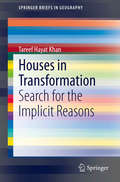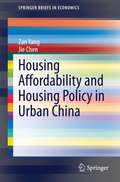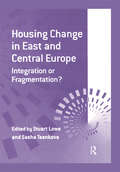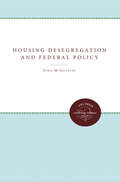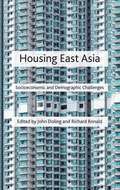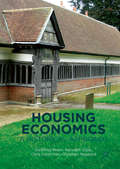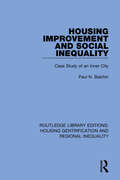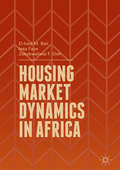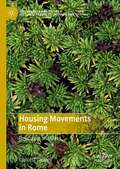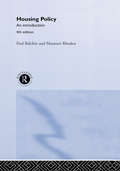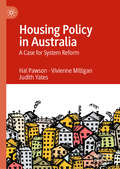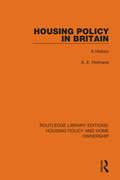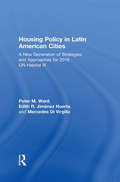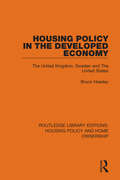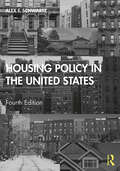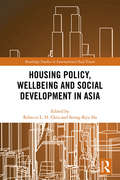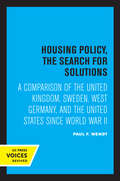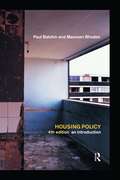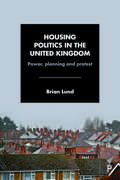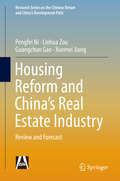- Table View
- List View
Houses in Transformation
by Tareef Hayat KhanThis book analyzes the reasons of spontaneous transformation in self-built houses in the context of developing countries. Recognizing Housing Transformation as a natural phenomenon, the book focuses on self-built houses in the city of Dhaka. Firstly, it explains the explicit reasons behind spontaneous housing transformations. Then the book carefully unveils the implicit values that are hidden behind those explicit reasons. The entire book is an ethnographic journey, which expresses unique stories behind houses in transformation.
Housing Affordability and Housing Policy in Urban China
by Zan Yang Jie ChenThis book provides a comprehensive analysis of housing affordability under the economic reforms and social transformations in urban China. It also offers an overall review of the current government measures on the housing market and affordable housing policies in China. By introducing a dynamic affordability approach and residual income approach, the book allows us to capture the size of the affordability gap more accurately, to better identify policy targets, and to assess the effectiveness of current public policy. The unique database on urban household surveys and regional information on affordable housing projects serve to strengthen the analysis. The book offers theoretical and empirical insights for in-depth affordability studies and helps readers to understand the social impacts of market reforms and the role of government on the Chinese housing market.
Housing Change in East and Central Europe: Integration or Fragmentation?
by Sasha TsenkovaTen years after the fall of the Berlin Wall, patterns of change to the former communist nations of Europe are now discernible in a way that was impossible to see in the initial years. This insightful book focuses on the case of changes in housing based on evidence collected from across the Central and Eastern European region. The volume adopts a conceptual framework and provides cross-regional analysis, amongst which is situated a series of more focused case studies. Issues examined include the consequences of the rapid privatization of state rental housing including the emergence of 'super-owner-occupied' countries, dramatic changes in urban structure and evidence that housing, having been the shock absorber against which wider economic restructuring has occurred, now faces a whole series of deferred problems. The enthusiasm with which the market economy was initially embraced must now be tempered by a more sober assessment of what in reality has happened.
Housing Decisions
by Evelyn L. Lewis Carolyn S. TurnerGives students the guidelines they will need to make wise housing choices.
Housing Decisions
by Evelyn L. Lewis Carolyn S. TurnerHousing Decisions is designed to encourage a broad understanding and appreciation of the housing and interior design fields. Topics will lead you through the many issues faced when selecting and personalizing a home. Various housing and design options are presented to help you recognize the wide variety of choices available for addressing different needs and life situations.
Housing Desegregation and Federal Policy (Urban and Regional Policy and Development Studies)
by John M. GoeringHousing desegregation is one of America's last civil rights frontiers. Drawing on the expertise of social scientists, civil rights attorneys, and policy analysts, these original essays present the first comprehensive examination of housing integration and federal policy covering the last two decades. This collection examines the ambiguities of federal fair housing law, the shifting attitudes of white and black Americans toward housing integration, the debate over racial quotas in housing, and the efficacy of federal programs.Title VI of the Civil Rights Act of 1964 banned discrimination in federally assisted housing, and Title VIII of the Civil Rights Act of 1968 banned discrimination in most of the private housing market. Housing Desegregation and Federal Policy shows that America has made only modest progress in desegregating housing, despite these federal policies.Providing a balanced assessment of federal policies and programs is complicated because of disagreement over the nature of the federal government's role in this area. Disagreements over the meaning of federal law coupled with white and black disinterest in desegregation have compounded the difficulties in promoting residential integration.The authors employ research findings as well as legal and policy analysis in examining these complex issues. They consider a broad range of issues related to housing desegregation and integration, offering new sources of evidence and ideas for future research and policymaking.Originally published in 1986.A UNC Press Enduring Edition -- UNC Press Enduring Editions use the latest in digital technology to make available again books from our distinguished backlist that were previously out of print. These editions are published unaltered from the original, and are presented in affordable paperback formats, bringing readers both historical and cultural value.
Housing East Asia
by John Doling Richard RonaldThis book provides an up-to-date account of housing policy systems in eight countries - Hong Kong, Indonesia, Japan, Korea, Malaysia, Taiwan, Thailand and Singapore. With one chapter devoted to each country, there are, in addition, introductory and concluding chapters, in which the editors identify both the similarities in the problems faced, and in the approaches adopted, by the governments of the Asian countries - setting them apart from the West - as well as the differences that indicate the variety of Asian solutions.
Housing Economics
by Geoffrey Meen Kenneth Gibb Chris Leishman Christian A. NygaardThe world has still to emerge fully from the housing-triggered Global Financial Crisis, but housing crises are not new. The history of housing shows long-run social progress, littered with major disasters; nevertheless the progress is often forgotten, whilst the difficulties hit the headlines. Housing Economics provides a long-term economic perspective on macro and urban housing issues, from the Victorian era onwards. A historical perspective sheds light on modern problems and the constraints on what can be achieved; it concentrates on the key policy issues of housing supply, affordability, tenure, the distribution of migrant communities, mortgage markets and household mobility. Local case studies are interwoven with city-wide aggregate analysis. Three sets of issues are addressed: the underlying reasons for the initial establishment of residential neighbourhoods, the processes that generate growth, decline and patterns of integration/segregation, and the impact of historical development on current problems and the implications for policy.
Housing Finance Systems
by Sock-Yong PhangThe term 'housing crisis' has recently been associated with rising foreclosure rates and tottering financial institutions, particularly in the US and Europe. However, in many emerging countries, the housing crisis is about urban poverty, unplanned settlements, overcrowded slums and homelessness.
Housing Finance and Mortgage-Backed Securities in Mexico
by Luisa Zanforlin Marco EspinosaA report from the International Monetary Fund.
Housing Improvement and Social Inequality: Case Study of an Inner City
by Paul N. BalchinOriginally published in 1979, this book discusses housing improvement, and particularly its effects upon the residential population of the inner areas of West London. The economic and social rationale is explained, and the role of landlords, developers and local authorities is analysed. The book concentrates both on the defects of the improvement process as a whole, and on the application of housing legislation within a specific geographical area. Housing improvement is related to the debate about the inequality of wealth by implicitly questioning who benefits and who loses from improvement policy.
Housing Market Dynamics in Africa
by Issa Faye El-hadj M. Bah Zekebweliwai F. GehThis open access book utilizes new data to thoroughly analyze the main factors currently shaping the African housing market. Some of these factors include the supply and demand for housing finance, land tenure security issues, construction cost conundrum, infrastructure provision, and low-cost housing alternatives. Through detailed analysis, the authors investigate the political economy surrounding the continent’s housing market and the constraints that behind-the-scenes policy makers need to address in their attempts to provide affordable housing for the majority in need. With Africa’s urban population growing rapidly, this study highlights how broad demographic shifts and rapid urbanization are placing enormous pressure on the limited infrastructure in many cities and stretching the economic and social fabric of municipalities to their breaking point. But beyond providing a snapshot of the present conditions of the African housing market, the book offers recommendations and actionable measures for policy makers and other stakeholders on how best to provide affordable housing and alleviate Africa’s housing deficit. This work will be of particular interest to practitioners, non-governmental organizations, private sector actors, students and researchers of economic policy, international development, and urban development.
Housing Movements in Rome: Resistance and Class (Alternatives and Futures: Cultures, Practices, Activism and Utopias)
by Carlotta CaciagliThis book explores contemporary challenges of housing movement organizations, looking specifically at the case of Rome, Italy. The work identifies conditions that allow the re-composition of a class of housing dispossessed and, consequently, the features of its action in urban spaces. The book offers fresh analytical perspectives to understanding contemporary urban transformation via new spatial and strategic approaches. In striking detail, Carlotta Caciagli shows how space is a crucial variable in shaping the strategies that allow for the politicisation of a movement’s social base. She illustrates how new spatial configurations of urban space result from unique struggles of the recomposed collective subject. Most notably, three main conceptual tools are introduced to disentangle the relationship between the recomposed precarious class and space: “the spatial opportunity structure”, “configurations of strategies” and “educational sites of resistance”.
Housing Philosophy: Applying Concepts to Policy
by Yoric Irving-ClarkeThis book addresses key issues in housing policy through the lens of the philosophical concepts that underpin them. It is intended to be an introduction to philosophical subjects and how they relate to key housing issues and deals with the concepts with enough rigour and depth to be of use to undergraduate and postgraduate students and teachers. Both practitioners in the housing sector and academics researching housing-related subjects often use terms such as ‘fairness’, ‘social justice’, ‘tenure’, ‘property’, ‘home’ and others as if there is a single agreed meaning for these terms. But these terms can be highly contested and there are multiple viewpoints for each of them that could change how we approach them, and how we therefore create, interpret and implement policies and procedures. This book aims to introduce certain concepts and provide guidance and stimulate thinking around how they make an impact on real-world policy. Each section opens with a relevant case study designed to highlight the philosophical concepts to be discussed and coverage ranges from homelessness to the role of government and the state, to house prices, value and property rights. This book will be of interest to students at both undergraduate and postgraduate levels, studying housing qualifications or philosophy, sociology, politics, governance and social policy – it will be of particular use for those interested in the application of philosophical concepts to a real-world policy area with clear consequences.
Housing Policy In The United States: An Introduction
by Alex F. SchwartzHousing Policy in the United States is an essential guidebook to, and textbook for, housing policy, it is written for students, practitioners, government officials, real estate developers, and policy analysts. It discusses the most important issues in the field, introduces key concepts and institutions, and examines the most important programs. Written as an introductory text, it explains all concepts, trends, and programs without jargon, and includes empirical data concerning program evaluations, government documents, and studies carried out by the author and other scholars. The first chapters present the context surrounding US housing policy, including basic trends and problems, the housing finance system, and the role of the federal tax system in subsidizing homeowner and rental housing. The middle chapters focus on individual subsidy programs. The closing chapters discuss issues and programs that do not necessarily involve subsidies, including homeownership, mixed-income housing, and governmental efforts to improve access to housing by reducing discriminatory barriers in the housing and mortgage markets. The concluding chapter also offers reflections on future directions of US. housing policy.
Housing Policy in Australia: A Case for System Reform
by Judith Yates Hal Pawson Vivienne MilliganThis book, the first comprehensive overview of housing policy in Australia in 25 years, investigates the many dimensions of housing affordability and government actions that affect affordability outcomes. It analyses the causes and implications of declining home ownership, rising rates of rental stress and the neglect of social housing, as well as the housing situation of Indigenous Australians. The book covers a period where housing policy primarily operated under a neo-liberal paradigm dominated by financial de-regulation and fiscal austerity. It critiques the broad and fragmented range of government measures that have influenced housing outcomes over this period. These include regulation, planning and tax policies as well as explicit housing programs. The book also identifies current and future housing challenges for Australian governments, recognizing these as a complex set of inter-connected problems. Drawing on its coverage of the economics, politics and administration of housing provision, the book sets out priorities for the transformational national strategy needed for a fairer and more productive housing system, and to improve affordability outcomes for the most vulnerable Australians.
Housing Policy in Britain: A History
by A. E. HolmansOriginally published in 1987, this book provides a comprehensive history of housing policy in Britain from the beginning of the twentieth century to the end of the 1970s. For every period the author gives a detailed account of the housing situation in which policies operated, the policies pursued and their rationale. Owner-occupation and privately rented housing are fully discussed. Particular emphasis is placed on the financial and economic aspects of housing policy, including the impact on it of the economic situation. Issues such as population growth and the increase in the number of households are also examined.
Housing Policy in Latin American Cities: A New Generation of Strategies and Approaches for 2016 UN-HABITAT III (Cambridge Latin American Studies #50)
by Peter M. Ward Edith R. Jiménez Huerta María Mercedes Di VirgilioAfter the 1960s, rapid urbanization in developing regions in Latin America, Africa, and Asia was marked by the expansion of low-income "irregular" settlements that developed informally and which, by the 2000s, often constituted between 20-60 percent of the built-up area of metropolitan areas and other large cities. There has been a variety of research directed at the housing policies involved with these informal settlements, yet apart from the activities of Latin American Housing Network (LAHN), there has been minimal attention directed at the earliest portion of settlements that formed some 25-40 years ago that now form a large part of the intermediate ring of the cities. This volume breaks new ground by opening up a new generation of housing policy in Latin America cities with broader application for other developing countries. Its editors bring unique perspectives: Peter Ward coordinates the LAHN, and Edith Jiménez and María Di Virgilio are founding members of the network who have led project teams in Guadalajara and Buenos Aires respectively. Developed as a coordinated collaborative research project, the volume encompasses nine Latin American countries and eleven cities. The editors and contributors offer original perspectives on the policy challenges facing much of the low income housing of Latin American cities; document the changing nature of the "first suburbs"; present comparative survey findings in order to better understand the types of consolidated settlements that exist today; describe the physical nature of the dwellings themselves; identify the reasons behind market dysfunction that impede the operation of consolidated housing informal markets in Latin American cities; and outline a new generation of housing policies that will support the processes of densification, rehabilitation, and regeneration of these settlements. This book is the first and only composite overview of the research findings and advocacy of the generic policy lines that the LAHN identifies as central to a new generation of housing strategies and approaches. Researchers and practitioners working on housing theory, housing policy, comparative spatial and sociological research, and urban development issues will find the book highly significant.
Housing Policy in the Developed Economy: The United Kingdom, Sweden and The United States
by Bruce HeadeyOriginally published in 1978, this book analyses three main approaches to national housing policy in the 20th Century in Sweden, the UK and USA. It reviews policy developments and considers the impact of policy on the housing conditions and costs of different sections of the community. A major theme is that British and American governments, contrary to their stated objectives, have actually increased housing inequality by allowing homeowners tax concessions which are more generous than the housing welfare programmes available to tenants. The political pressures which produced this outcome in Britain and the USA, but a quite different and more egalitarian outcome in Sweden, are carefully discussed. Throughout the book, policy making is regarded as involving trade-offs between what is politically feasible and what is operationally feasible. This framework enables readers to view policy making from the perspective of politicians and civil servants as they react to diverse demands and pressures and seek to devise housing programmes which embody incentives to which housing financiers builders and consumers will respond.
Housing Policy in the United States
by Alex F. SchwartzThe fourth edition of Housing Policy in the United States refreshes its classic, foundational coverage of the field with new data, analysis, and comparative focus. This landmark volume offers a broad overview that synthesizes a wide range of material to highlight the significant problems, concepts, programs and debates that all defi ne the aims, challenges, and milestones within and involving housing policy. Expanded discussion in this edition centers on state and local activity to produce and preserve affordable housing, the impact and the implications of reduced fi nancial incentives for homeowners.Other features of this new edition include:• Analysis of the impact of the Tax Cuts and Jobs Act of 2017 on housing- related taxexpenditures;• Review of the state of fair housing programs in the wake of the Trump Administration’s rollbackof several key programs and policies;• Cross- examination of U.S. housing policy and conditions in an international context.Featuring the latest available data on housing patterns and conditions, this is an excellent companionfor graduate and advanced undergraduate courses in urban studies, urban planning, sociologyand social policy, and housing policy.
Housing Policy, Wellbeing and Social Development in Asia (Routledge Studies in International Real Estate)
by Rebecca Lai Chiu Seong-Kyu HaThis book investigates how housing policy changes in Asia since the late 1990s have impacted on housing affordability, security, livability, culture and social development. <P><P> Using case study examples from countries/cities including China, Hong Kong, India, Japan, Taiwan, Korea, Malaysia, Bangladesh, Singapore, Indonesia, Thailand and Vietnam, the contributors contextualize housing policy development in terms of both global and local socio-economic and political changes. They then investigate how policy changes have shaped and re-shaped the housing wellbeing of the local people and the social development within these places, which they argue should constitute the core purpose of housing policy. <P><P> This book will open up a new dimension for understanding housing and social development in Asia and a new conceptual perspective with which to examine housing which, by nature, is culture-sensitive and people-oriented. It will be of interest to students, scholars and professionals in the areas of housing studies, urban and social development and the public and social policy of Asia.
Housing Policy, the Search for Solutions: A Comparison of the United Kingdom, Sweden, West Germany, and the United States since World War II
by Paul F. WendtThis title is part of UC Press's Voices Revived program, which commemorates University of California Press’s mission to seek out and cultivate the brightest minds and give them voice, reach, and impact. Drawing on a backlist dating to 1893, Voices Revived makes high-quality, peer-reviewed scholarship accessible once again using print-on-demand technology. This title was originally published in 1962.
Housing Policy: An Introduction
by Maureen Rhoden Paul BalchinNow in its fourth edition, this textbook has been completely revised to examine the current state of housing policy in the UK. Exploring developments in housing policy made since Labour's 1997 electoral victory, the book addresses current issues including the 'brownfield versus greenfield' debate; the phasing out of renovation grants; the transfer of local authority housing to registered social landlords; boom, slump and boom in the owner-occupied sector.Other topics addressed range from regional policy and housing across the UK, to social exclusion, community care and homelessness.
Housing Politics in the United Kingdom: Power, Planning and Protest
by Brian LundWith rapid population growth, a long-term dearth in new housing construction, the emergence of ‘generation rent’ and rising homelessness, the issue of housing in the UK is considered complex, open-ended and intractable. Using insights from public choice theory, the new institutionalism and social constructionism Housing Politics in the United Kingdom locates the contemporary ‘housing question’ in historically entrenched power relationships involving markets, planning, and territorial electoral politics. Written to complement the 3rd edition of the author’s bestselling Understanding housing policy (forthcoming, 2017), this book will be essential reading for students of Housing, Social Policy, Social History, Urban Studies, Planning and Political Science.
Housing Reform and China’s Real Estate Industry: Review and Forecast (Research Series on the Chinese Dream and China’s Development Path)
by Pengfei Ni Linhua Zou Guangchun Gao Xuemei JiangThis book provides an in-depth analysis of China’s housing system and real-estate industry .The author weaves together the different elements of the real estate industry into a logically coherent whole, in which the relationship between the real-estate industry and the macroeconomy sets the background, the housing market forms the core, real estate finance makes up a necessary condition, public policy provides the guarantee and the housing system the foundation.The book constructs an analytical framework for the development of China’s housing system that considers a comprehensive range of factors, highlights the most important issues, and is soundly structured, logical and clear. By applying this framework, the authors present an overview of the past, present and future of China’s housing industry.
